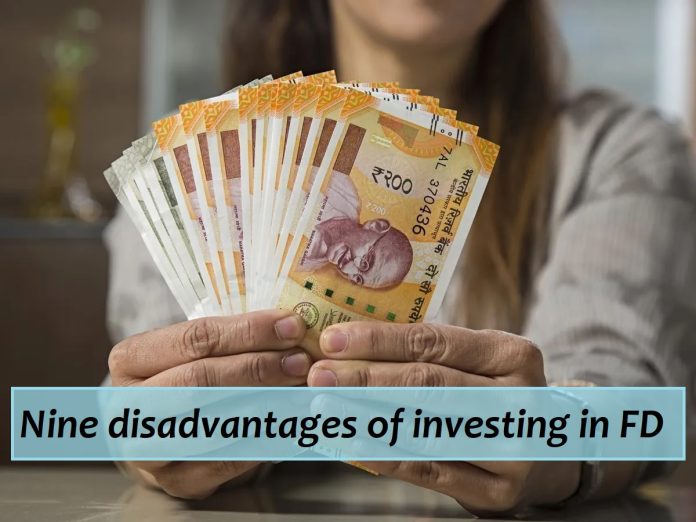Nine disadvantages of investing in FDs: When it comes to investing in India, bank fixed deposits (FDs) continue to be the most popular investment option. The majority of Indians routinely choose to invest in them. The rising FD interest rates since May 2022 have also made it a great investment option. Not only salaried class, or senior citizens, even millennials are showing an increased interest in investing in term deposits. Money experts believe that despite being a fantastic investment choice, fixed deposits aren’t without flaws, it comes with a number of drawbacks. So while making an informed choice as an investor, one needs to be aware of them.
Disadvantages of investing in bank fixed deposits (FDs)
1)Lower returns
The disadvantages of investing in fixed deposits are that fixed deposits offer a fixed rate of interest, which is typically lower than the returns offered by other investment options such as stocks or mutual funds. “One of the main drawbacks of fixed deposits is that the rates are typically lower than those offered by other investment options,” said Vinit Khandare, CEO and Founder, MyFundBazaar.
2)Fixed interest rate
Another drawback of fixed deposits is that the interest rate is set at the time of application. When you open an FD at a certain interest rate, you continue to earn interest at that rate until the end of the tenure
3) Lock-in period
Once you invest in a fixed deposit, your money is locked in for the term of the deposit. This means that you cannot access your money until the term has expired, even if you have an emergency.
4) TDS
The interest you earn on a fixed deposit is taxable income. Amit Gupta, MD, SAG Infotech said that this means that you will have to pay taxes on the interest you earn, which will reduce your overall returns.
Fixed deposit interest falls under the category of “Income from Other Sources.” Your tax rate will depend on your income slab rate because the interest on your FD is applied to your overall income before being taxed, said Khandare.
5) The unbeatable inflation
An investment’s return should ideally exceed the rate of inflation, even after taxes are taken into consideration. The interest rate on a fixed deposit, however, typically tends to be less than the rate of inflation in most circumstances. According to Khandare, it is not a good idea to invest in fixed deposits if they don’t provide returns that outpace inflation because they won’t be able to keep up with rising living expenses.
“The rate of inflation is the rate at which prices for goods and services increase over time. If the rate of inflation is higher than the interest rate on your fixed deposit, your money will lose value over time,” said Amit Gupta, MD, SAG Infotech.
6) Liquidity
Fixed deposits are not very liquid, which means that it can be difficult to sell them quickly if you need to access your money. “The money is locked in an FD, you might not be able to access them in the event of an urgent monetary need,” said Khandare
7) No capital gains
Amit Gupta. said that you do not earn any capital gains on a fixed deposit. This means that you cannot make any money from the appreciation of the value of your investment.
8) Bank could go bankrupt
According to Amit Gupta, although fixed deposits are considered to be a safe investment, there is always a risk that the bank could go bankrupt. If this happens, you may lose all or part of your investment.
9) Penalty on premature withdrawal
The banks provide the depositors an option for premature withdrawal of their FDs. However, they have a pay a fee for premature withdrawal of deposits. “Banks typically impose a penalty when you choose to withdraw your fixed deposit early. The penalty may be assessed at a rate of 1% to 3% of the total interest,” said Khandare.
Best Bank FD rates: SBI vs HDFC vs ICICI vs PNB vs Axis
- State Bank of India FD rates- 3% to 7.10%
- HDFC Bank FD rates- 3% to 7.25%
- ICICI Bank FD rates- 3% to 7.10%
- Punjab National Bank FD rates- 3.50% to 7.25%
- Axis Bank- 3% to 7.45%
It is important to weigh the pros and cons of fixed deposits before investing your money. If you are looking for a safe investment with guaranteed returns, then a fixed deposit may be a good option for you. However, if you are looking for higher returns or more flexibility, you may want to consider other investment options.
Disclaimer: The views and recommendations made above are those of individual analysts, and not of Mint. We advise investors to check with certified experts before taking any investment decisions.

